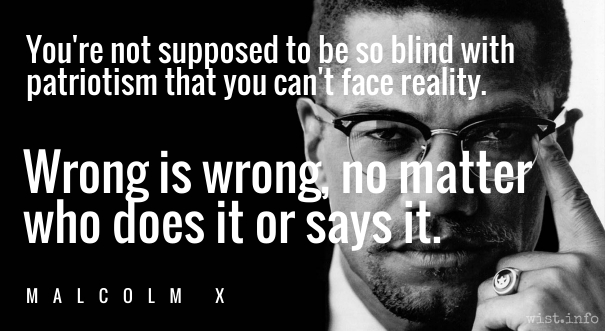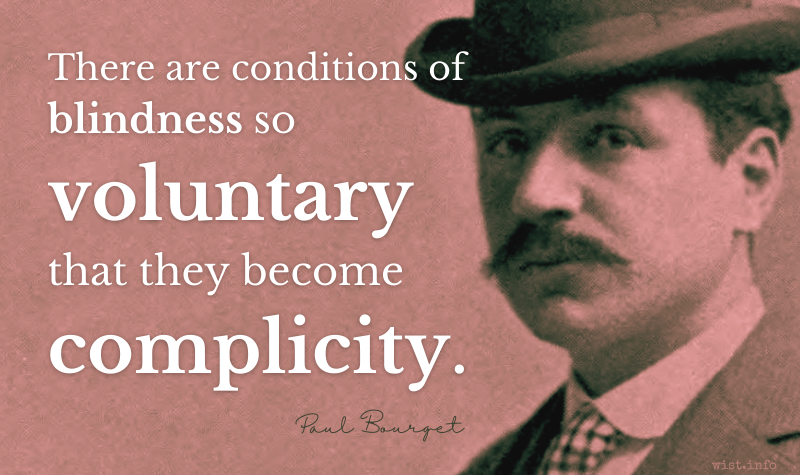And yet there are some men here in this Senate who either genuinely fail to see, or make a pretense of not seeing, the disasters by which we are menaced. Their mildness has fostered Catiline’s hopes, and their refusal to believe in his growing conspiracy has given it strength. Had I punished Catiline, their influence would cause many persons, some of them malignant but others merely ignorant, to say that I had acted with tyrannical brutality.
[Quamquam non nulli sunt in hoc ordine qui aut ea quae imminent non videant aut ea quae vident dissimulent; qui spem Catilinae mollibus sententiis aluerunt coniurationemque nascentem non credendo conroboraverunt; quorum auctoritate multi non solum improbi verum etiam imperiti, si in hunc animadvertissem, crudeliter et regie factum esse dicerent.]
Marcus Tullius Cicero (106-43 BC) Roman orator, statesman, philosopher
Orationes in Catilinam [Catilinarian Orations], No. 1, § 12, cl. 30 (1.12.30) (63-11-08 BC) [tr. Grant (1960)]
(Source)
Urging the Senate banish Catiline before he and his followers overthrow the Roman Republic.
(Source (Latin)). Alternate translations:
Although there are some in this House, who either not see what is imminent, or dissemble what they see; who have cherish'd the hopes of Catiline with useless (?) Votes, and have confirmed the rising Conspiracy, by not believing it: whose Authority many, not onely out of malice, but of simplicity following, had I executed him, would have said, it had been a cruel and tyrannical Act
[tr. Wase (1671)]
Yet even now, in this very assembly, there are senators, and those not a few, who do not see the impending danger; or, seeing it, think proper to disguise their sentiments. By specious moderation they have pampered the hopes of Catiline, and, affecting to think my fears no more than a false alarm; they favoured the conspiracy in its birth; By their example numbers have been influenced; the evil-minded raised a spirit of discontent, and the weak joined in the clamour, All of that description would be ready to pronounce the death of Catiline the act of a violent and arbitrary Consul.
[tr. Sydney (1795)]
Though there are some men in this body who either do not see what threatens, or dissemble what they do see; who have fed the hope of Catiline by mild sentiments, and have strengthened the rising conspiracy by not believing it; influenced by whose authority many, and they not wicked, but only ignorant, if I punished him would say that I had acted cruelly and tyrannically.
[tr. Yonge (1856)]
Although there are in this assembly some who either may not see those things which are impending, or who may conceal their knowledge of those things which they see; who have nourished the hope of Catiline by mild opinions, and who have strengthened the growing conspiracy by not believing it; following whose authority many, not only the wicked, but also the unskillful, if I should have inflicted punishment on him, would say that this had been done cruelly and tyrannically.
[tr. Mongan (1879)]
Although there are some in this order (assembly), who either may see not those (things) which impend, or may dissemble those (things), which they see: who have nourished the hope of Catiline by soft (mild) opinions, and have strengthened the growing conspiracy by believing (it) not. The authority of whom many having followed, not only the dishonest, but also the unskillful, if I might have animadverted upon him (if I had punished him), would say (it) to have been done cruelly and royally (tyrannically).
[tr. Underwood (1885)]
Although there are some in this order [body], who either may not see these (things) which impend, or may dissemble those (things) which they see: who have nourished the hope of Catiline by soft [mild] opinions, and have strengthened the growing conspiracy by not believing (it). The authority of whom many have followed, not only the dishonest, but also the inexperienced, if I had given attention to [punished] him they, would say )it) to have [had] been done cruelly and royally [tyrannically].
[tr. Dewey (1916)]
And yet there are several men in this body, of the kind who either do not see what is threatening to them, or disguise what things they see, and these men nourish the hope of Catiline by tender notions and strengthen the young conspiracy by not believing; by whose authority many not only wicked (men), but also inexperienced (men), if I were to have (Catiline) punished , would say that it had been done cruelly and despotically.
[IB Notes]
Quotations about:
blindness
Note not all quotations have been tagged, so Search may find additional quotes on this topic.
Blind greed! Brainless rage!
In our brief lives they drive us beyond sense
And leave us misery for a heritage
Throughout eternity![Oh cieca cupidigia e ira folle,
che sì ci sproni ne la vita corta,
e ne l’etterna poi sì mal c’immolle!]Dante Alighieri (1265-1321) Italian poet
The Divine Comedy [Divina Commedia], Book 1 “Inferno,” Canto 12, l. 49ff (12.49-51) (1309) [tr. James (2013)]
(Source)
On seeing Phlegethon, the river of boiling blood, in which those who violently injured others (through greed or wrath) are forced to stand for all eternity.
Some versions have this as something Virgil says; most make it an exclamation of Dante's.
(Source (Italian)). Alternate translations:
O foolish Rage, O blind desire,
That spurs you on, in the short life above,
To such dire Acts as to eternity
Will keep you in this wretched bath below!
[tr. Rogers (1782), l. 45ff]
O blind lust!
O foolish wrath! who so dost goad us on
In the brief life, and in the eternal then
Thus miserably o’erwhelm us.
[tr. Cary (1814)]
Oh blinded lust! oh anger void of sense!
To spur us o'er the shorter life so bold,
So fell to steep us in the life immense!
[tr. Dayman (1843)]
Oh blind cupidity [both wicked and foolish],
which so incites us in the short life, and then,
in the eternal, steeps us so bitterly!
[tr. Carlyle (1849)]
O blind cupidity! O foolish wrath!
Thorough this short life, that spurs them to the sleep,
Eternally in tide like this to steep.
[tr. Bannerman (1850), from Virgil]
Oh, blinded greediness! oh, foolish rage!
Which spur us so in the short world of life,
And then in death so drown us in despair!
[tr. Johnston (1867)]
O blind cupidity, O wrath insane,
That spurs us onward so in our short life,
And in the eternal then so badly steeps us!
[tr. Longfellow (1867)]
O blind covetousness! O foolish wrath! that dost so spur us in our short life, and afterward in the life eternal dost in such evil wise steep us!
[tr. Butler (1885)]
O blind cupidity, O foolish ire,
Which spurs us on so in our life's short day,
And soaks us till Eternity expire!
[tr. Minchin (1885)]
Oh blind cupidity, both guilty and mad, that so spurs us in the brief life, and then, in the eternal, steeps us so ill!
[tr. Norton (1892)]
O sightless greed! O foolish wrath! that dost in our short life, so goad us; and after, in the life that hath no end, dost sink us in such evil plight.
[tr. Sullivan (1893), from Virgil]
Oh, blind cupidity! Oh, senseless anger,
Which in the brief life spurs us on so hotly.
And in the eternal then so sadly dips us !
[tr. Griffith (1908)]
O blind covetousness and foolish anger, which in the brief life so goad us on and then, in the eternal, steep us in such misery!
[tr. Sinclair (1939)]
O blind greed and mad anger, all astray
That in the short life goad us onward so,
And in the eternal with such plungings pay!
[tr. Binyon (1943)]
O blind, O rash and wicked lust of spoil,
That drives our short life with so keen a goad
And steeps our life eternal in such broil!
[tr. Sayers (1949)]
Oh blind!
Oh ignorant, self-seeking cupidity
which spurs us so in the short mortal life
and steeps us so through all eternity!
[tr. Ciardi (1954)]
O blind cupidity and mad rage, which in the brief life so goad us on, and then, in the eternal, steep us so bitterly!
[tr. Singleton (1970)]
O blind cupidity and insane wrath,
spurring us on through our short life on earth
to steep us then forever in such misery!
[tr. Musa (1971)]
O blind cupidity and insane anger,
which goad us on so much in our short life,
then steep us in such grief eternally!
[tr. Mandelbaum (1980)]
O blind cupidity and senseless anger,
Which so goads us in our short life here
And, in the eternal life, drenches us miserably!
[tr. Sisson (1981)]
O blind desire
Of covetousness, O anger gone insane --
That goad us on through life, which is so brief,
to steep in eternal woe when life is done.
[tr. Pinsky (1994)]
Oh blind cupidity and mad rage, that so spur us in this short life, and then in the eternal one cook us so evilly!
[tr. Durling (1996)]
O blind desires, evil and foolish, which so goad us in our brief life, and then, in the eternal one, ruin us so bitterly!
[tr. Kline (2002)]
O blind cupidity, that brew of bile
and foolishness, which bubbles our brief lives,
before it steeps us in eternal gall!
[tr. Carson (2002)]
What blind cupidity, what crazy rage
impels us onwards in our little lives --
then dunks us in this stew to all eternity!
[tr. Kirkpatrick (2006)]
O blind covetousness, insensate wrath,
which in this brief life goad us on and then,
in the eternal, steep us in such misery!
[tr. Hollander/Hollander (2007)]
O greedy blindness and rage, insane and senseless,
Spurring us on in this, our so short life,
Then immolating us forever and ever!
[tr. Raffel (2010)]
We are all more blind to what we have than to what we have not.
Audre Lorde (1934-1992) American writer, feminist, civil rights activist
“Notes from a Trip to Russia,” Sister Outsider (1984)
(Source)
Our blunders mostly come from letting our wishes interpret our duties, or hide from us plain indications of unwelcome tasks.
Alexander Maclaren (1826-1910) Scots-English minister, homilist
The Secret of Power: And Other Sermons, Sermon 15 “Moses and Hobab” (1902)
(Source)
There are few of us who are not protected from the keenest pain by our inability to see what it is that we have done, what we are suffering, and what we truly are. Let us be grateful to the mirror for revealing to us our appearances only.
Samuel Butler (1835-1902) English novelist, satirist, scholar
Erewhon, ch. 3 “Up the River” (1872)
(Source)
It was not the absence of intelligence which led us into trouble but our unwillingness to draw unpleasant conclusions from it.
You’re not supposed to be so blind with patriotism that you can’t face reality. Wrong is wrong, no matter who does it or says it.
Malcolm X (1925-1965) American revolutionary, religious leader [b. Malcolm Little]
“Prospects for Freedom in 1965,” speech, New York (7 Jan 1965)
(Source)
Self-love is often rather arrogant than blind; it does not hide our faults from ourselves, but persuades us that they escape the notice of others, and disposes us to resent censures lest we should confess them to be just.
Samuel Johnson (1709-1784) English writer, lexicographer, critic
The Rambler, #155 (10 Sep 1751)
(Source)
There are conditions of blindness so voluntary that they become complicity.
With whom does the greatest danger for the whole human future lie? Is it not with the good and just? — with those who say and feel in their hearts: “We already know what is good and just, we possess it, too; woe to those who are still searching for it!”













